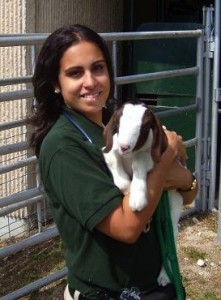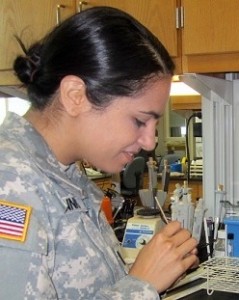UVP 004: Food Safety and Army Reserves Veterinarian Dr. Romina Hennig

 It’s finally here! You’ve all been very patient while waiting for another episode of the Uncommon Veterinarian Podcast, so today is your lucky day.
It’s finally here! You’ve all been very patient while waiting for another episode of the Uncommon Veterinarian Podcast, so today is your lucky day.
A fire in my medieval Sicilian neighborhood way back in March destroyed our high-speed internet cable, and we were dependent on a slow and expensive mobile connection for months. Goodbye, video chats and podcast interviews. Our home was finally reconnected a couple of weeks ago, though, and we’re back in business.
Dr. Romina Hennig: Food Safety & Army Reserves Veterinarian
 In this episode, I interview Dr. Romina Hennig, a 2009 veterinary graduate from the University of Florida. She currently works full-time in Washington, D.C., as an Enforcement, Investigations, and Analysis Officer with the U.S. Department of Agriculture’s (USDA) Food Safety and Inspection Service (FSIS).
In this episode, I interview Dr. Romina Hennig, a 2009 veterinary graduate from the University of Florida. She currently works full-time in Washington, D.C., as an Enforcement, Investigations, and Analysis Officer with the U.S. Department of Agriculture’s (USDA) Food Safety and Inspection Service (FSIS).
If you’re anything like I used to be, you’re probably thinking something like, “Ugh, I could never work as a vet for FSIS. All those hours working with dead animals on the slaughter lines sounds horrible.” It’s true that FSIS veterinarians play a key role in ensuring the safety of our country’s meat supply, but this role is primarily in the supervising of actual food inspectors who do the majority of the more tedious labor. Veterinarians are employed to work as veterinarians — animal and public health experts — not food inspectors.
 Dr. Hennig also serves as a Veterinary Corps officer in the U.S. Army Reserves, training with a unit that drills out of Joint Base McGuire-Dix-Lakehurst, New Jersey. I was especially interested to learn more about this work in the Reserves, as I’m seriously considering a transition into that area of military service when my commitment on active duty is up next summer.
Dr. Hennig also serves as a Veterinary Corps officer in the U.S. Army Reserves, training with a unit that drills out of Joint Base McGuire-Dix-Lakehurst, New Jersey. I was especially interested to learn more about this work in the Reserves, as I’m seriously considering a transition into that area of military service when my commitment on active duty is up next summer.
We discussed Dr. Hennig’s path into her current uncommon work as a veterinarian, and this quotation really resonated with me:
[quote]As an undergrad, I thought I was going to go to medical school, but ended up making the decision to go to veterinary school because I wanted to do something that would help both animals and humans. I didn’t realize at the time that this is basically the description of a public health veterinarian![/quote]
Links We Mentioned
Food Safety & Inspection Service: FSIS employs over 1,100 veterinarians, making it the largest employer in our profession. This collection of short biographies of current FSIS employees provides a nice introduction into the different types of jobs veterinarians can have with the organization. You can also learn more about applying for a job with FSIS here, or check out my blog post featuring five helpful resources for those who are interested in federal veterinary jobs. Learn about opportunities to set up a paid internship/externship with FSIS veterinarians here.
U.S. Army Reserve Veterinary Corps: You can find a great overview of current opportunities and assignments as a veterinarian in the Army Reserve here. The Army’s general site on the Veterinary Corps also has a lot of great information, but you can also learn about my personal experiences as a vet in the Army here.
What You Will Learn in This Episode
– what FSIS veterinarians actually do in their daily jobs
– why a job with FSIS can be a good foot in the door for other types of federal employment as a veterinarian
– what the salary and other benefits are for a new grad FSIS veterinarian and vet in the Army Reserve
– why the personal contacts Dr. Hennig made during her summer internships and elective rotations were so important for the success of her job hunt
– how you can set up a similar training experience to learn more about career options in food safety and public health
– why Dr. Hennig likes having the opportunity to “step into another life” during her Army Reserve training
The Interview
You can watch the video of our conversation right here, but keep scrolling down for the audio version which you can download for more convenient listening in the car, at the gym, or while you’re out walking the dogs. This episode clocks out at about 32 minutes.
The audio podcast also has a little bit higher production quality, with my best radio personality voice on the introduction and original music from my little brother Jonathan.
Thank you to everyone who has rated the podcast or left reviews for it on iTunes! I really appreciate your support.
Podcast: Play in new window | Download | Embed

Comments
Go Gators!
For someone who has not yet started vet school and who is still gaining experience before they apply… It’s there any possibility of shadowing a veterinarian like this? If so, how would one go about figuring out if there was one in their area? Thanks!
Hey Sarah, good question, and great idea to try to shadow vets in non-traditional fields prior to starting school. This will give you an edge in your application as well as helping you have a better idea of what you actually want to do as a veterinarian.
For the military, the best place to start is probably this map. You can find all the military vet clinics and try to get in contact with the veterinarians through the phone numbers listed there.
I’ll see if I can get Romina to give us a better idea for the USDA side of things…
Hi Sarah!
First of all, kudos for trying to get as varied an experience as possible before going to vet school. Like Elliott said, it’ll help you with both increasing your chances of having a successful vet school application and finding the path that’s right for you in the world of veterinary medicine. For experience with FSIS, your best bet would be to contact the District Office that serves your area and asking them if you can shadow one of the Public Health Veterinarians. Also, ask them if any of their Enforcement Investigations and Analysis Officers are veterinarians to see if you can shadow them too. I would also suggest that you ask if you can shadow the District Veterinary Medical Specialist. That one may be tougher to get, but they work specifically with humane handling so it’s pretty interesting. Here’s a link to the District Office contact info http://www.fsis.usda.gov/wps/portal/informational/districtoffices.
If you e-mail them and they don’t respond, try calling them (and vice versa).
I would also suggest contacting APHIS, which is another agency within USDA with lots of cool jobs for veterinarians. They just launched a new website that happens to not be working for me right now so I don’t have a good link for you, but if you go to http://www.aphis.usda.gov and click on “Contact Us” you can find the contact info for the Area Offices. These guys will be great resources for you too.
I hope this helps and good luck!
Go Gators!!
I really enjoyed watching this interview. I have always loved animals, but it is the public health side of vet. med that really made me seriously interested in pursuing this career. I met with the director for the Center for Public and Corporate Veterinary Medicine at Maryland during my last year as an undergrad and was immediately hooked. I applied to veterinary school for the first time this year and hope to eventually lead a unique path in vet. med like the two of you have. I live in the Washington, D.C. area and would be very interested in contacting or spending a bit of time with Dr. Hennig if at all possible. No pressure either way.
Thank you to both of you for putting this together. It has given me a look into some unique possibilities. I am very happy that I found this blog!
Also, I just read your reply to Sarah and am about to look into those options!